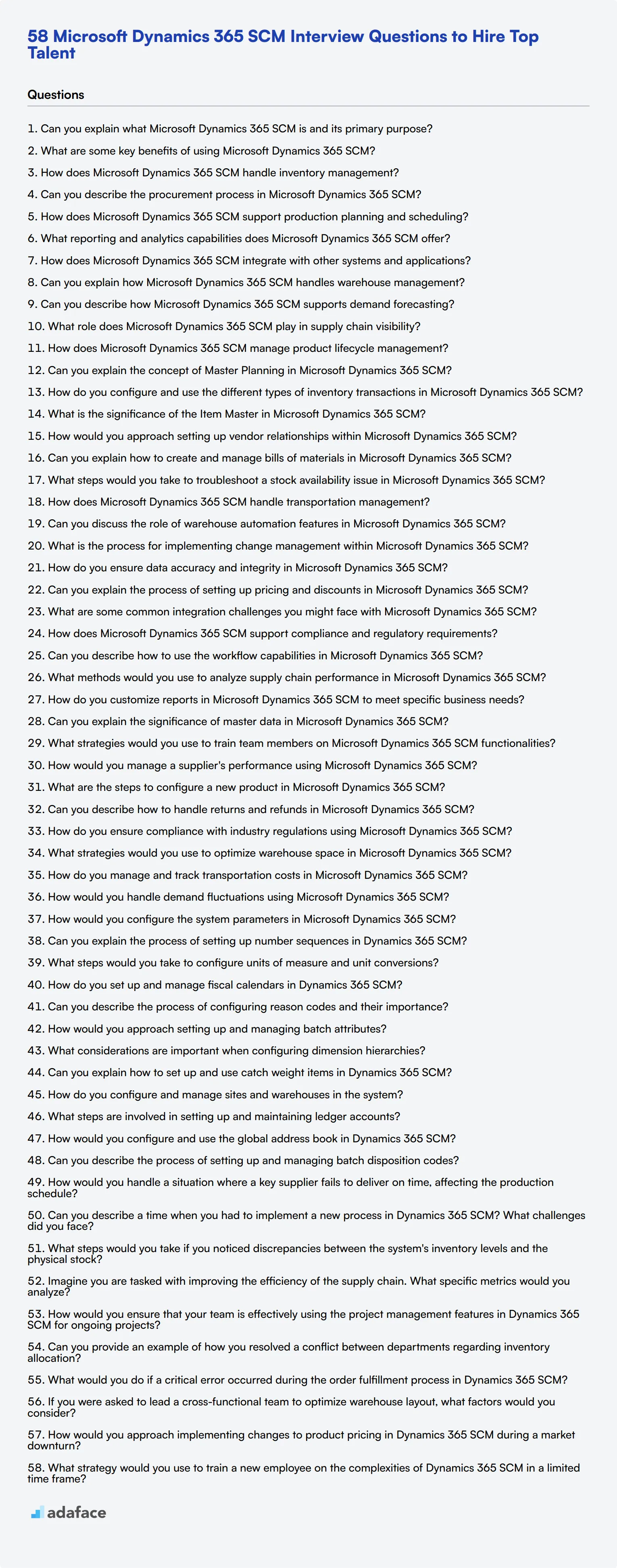Hiring the right Microsoft Dynamics 365 SCM specialists is crucial for organizations looking to optimize their supply chain operations. Asking the right interview questions helps recruiters and hiring managers identify candidates with the necessary skills and experience.
This blog post provides a comprehensive list of Microsoft Dynamics 365 SCM interview questions for various experience levels and specializations. We cover general questions, junior specialist queries, system functionality inquiries, configuration-related questions, and situational scenarios for top specialists.
By using these questions, you can effectively evaluate candidates' knowledge and problem-solving abilities in Microsoft Dynamics 365 SCM. Consider complementing your interview process with a pre-employment assessment to thoroughly gauge candidates' skills before the face-to-face interview.
Table of contents
8 general Microsoft Dynamics 365 SCM interview questions and answers to assess candidates

Ready to dive into the world of Microsoft Dynamics 365 SCM? These general interview questions will help you assess candidates' understanding of the platform and its core functionalities. Use this list to gauge a candidate's knowledge and problem-solving skills, ensuring you find the right fit for your supply chain team.
1. Can you explain what Microsoft Dynamics 365 SCM is and its primary purpose?
Microsoft Dynamics 365 Supply Chain Management (SCM) is a comprehensive enterprise resource planning (ERP) solution designed to help businesses optimize their supply chain operations. Its primary purpose is to integrate and streamline various aspects of supply chain management, including procurement, inventory, manufacturing, and distribution.
A strong answer should highlight that Dynamics 365 SCM provides real-time visibility into supply chain processes, enables data-driven decision-making, and helps businesses improve efficiency and reduce costs. Look for candidates who can explain how the platform connects different departments and processes within an organization.
2. What are some key benefits of using Microsoft Dynamics 365 SCM?
Key benefits of using Microsoft Dynamics 365 SCM include:
- Improved visibility across the entire supply chain
- Enhanced inventory management and demand forecasting
- Streamlined procurement processes
- Optimized production planning and scheduling
- Better warehouse management and logistics
- Increased operational efficiency and cost reduction
- Seamless integration with other Microsoft tools and third-party applications
An ideal candidate should be able to explain how these benefits translate into real-world improvements for businesses. Look for answers that demonstrate an understanding of how SCM can impact overall business performance and customer satisfaction.
3. How does Microsoft Dynamics 365 SCM handle inventory management?
Microsoft Dynamics 365 SCM offers robust inventory management capabilities. It provides real-time visibility into stock levels across multiple locations, automates reordering processes, and uses advanced algorithms for demand forecasting. The system also supports various inventory valuation methods and allows for easy tracking of goods movement.
A strong candidate should mention features like:
- Multi-warehouse management
- Batch and serial number tracking
- Quality control and inspection processes
- ABC classification for inventory prioritization
- Integration with IoT devices for real-time tracking
Look for answers that demonstrate an understanding of how these features can help businesses optimize their inventory levels, reduce carrying costs, and improve order fulfillment rates.
4. Can you describe the procurement process in Microsoft Dynamics 365 SCM?
The procurement process in Microsoft Dynamics 365 SCM typically involves the following steps:
- Creating and managing purchase requisitions
- Generating and sending purchase orders to vendors
- Receiving and inspecting goods
- Processing vendor invoices
- Managing vendor relationships and performance
A good candidate should highlight how the system automates many of these steps, such as automatically generating purchase orders based on inventory levels or production needs. They might also mention features like vendor portals for improved collaboration and supplier relationship management.
5. How does Microsoft Dynamics 365 SCM support production planning and scheduling?
Microsoft Dynamics 365 SCM offers comprehensive production planning and scheduling capabilities. It uses advanced algorithms to optimize production schedules based on demand forecasts, resource availability, and capacity constraints. The system supports both discrete and process manufacturing scenarios.
Key features a candidate might mention include:
- Master planning and material requirements planning (MRP)
- Capacity planning and scheduling
- Production order management
- Shop floor control
- Lean manufacturing support
- Integration with IoT devices for real-time production monitoring
Look for answers that demonstrate an understanding of how these features can help businesses improve production efficiency, reduce lead times, and better respond to changes in demand.
6. What reporting and analytics capabilities does Microsoft Dynamics 365 SCM offer?
Microsoft Dynamics 365 SCM provides powerful reporting and analytics capabilities to help businesses gain insights from their supply chain data. It offers a range of pre-built reports and dashboards, as well as tools for creating custom reports.
Key features include:
- Real-time analytics and KPI tracking
- Power BI integration for advanced visualizations
- Predictive analytics for demand forecasting
- AI-driven insights for identifying trends and anomalies
- Role-based dashboards for different user groups
A strong candidate should be able to explain how these analytics capabilities can drive better decision-making across the supply chain. Look for answers that demonstrate an understanding of how data-driven insights can lead to tangible business improvements.
7. How does Microsoft Dynamics 365 SCM integrate with other systems and applications?
Microsoft Dynamics 365 SCM is designed to integrate seamlessly with other Microsoft tools and third-party applications. It uses a common data model and provides APIs for easy integration. Some key integration points include:
- Integration with other Dynamics 365 apps (e.g., Finance, Sales)
- Connectivity with Office 365 for document management and collaboration
- Integration with Power Platform for custom app development and workflow automation
- Support for EDI (Electronic Data Interchange) for communication with trading partners
- APIs and connectors for integration with legacy systems and third-party applications
Look for candidates who can explain the importance of system integration in creating a cohesive business ecosystem. They should understand how integration can improve data flow, reduce manual data entry, and enhance overall operational efficiency.
8. Can you explain how Microsoft Dynamics 365 SCM handles warehouse management?
Microsoft Dynamics 365 SCM includes a comprehensive warehouse management module that helps businesses optimize their warehouse operations. Key features include:
- Advanced picking and put-away strategies
- Wave planning and processing for efficient order fulfillment
- Mobile device support for warehouse tasks
- Integration with material handling equipment
- Cross-docking capabilities
- Quality management and returns processing
A strong candidate should be able to explain how these features can improve warehouse efficiency, reduce errors, and enhance inventory accuracy. Look for answers that demonstrate an understanding of how effective warehouse management contributes to overall supply chain performance.
21 Microsoft Dynamics 365 SCM interview questions to ask junior specialists
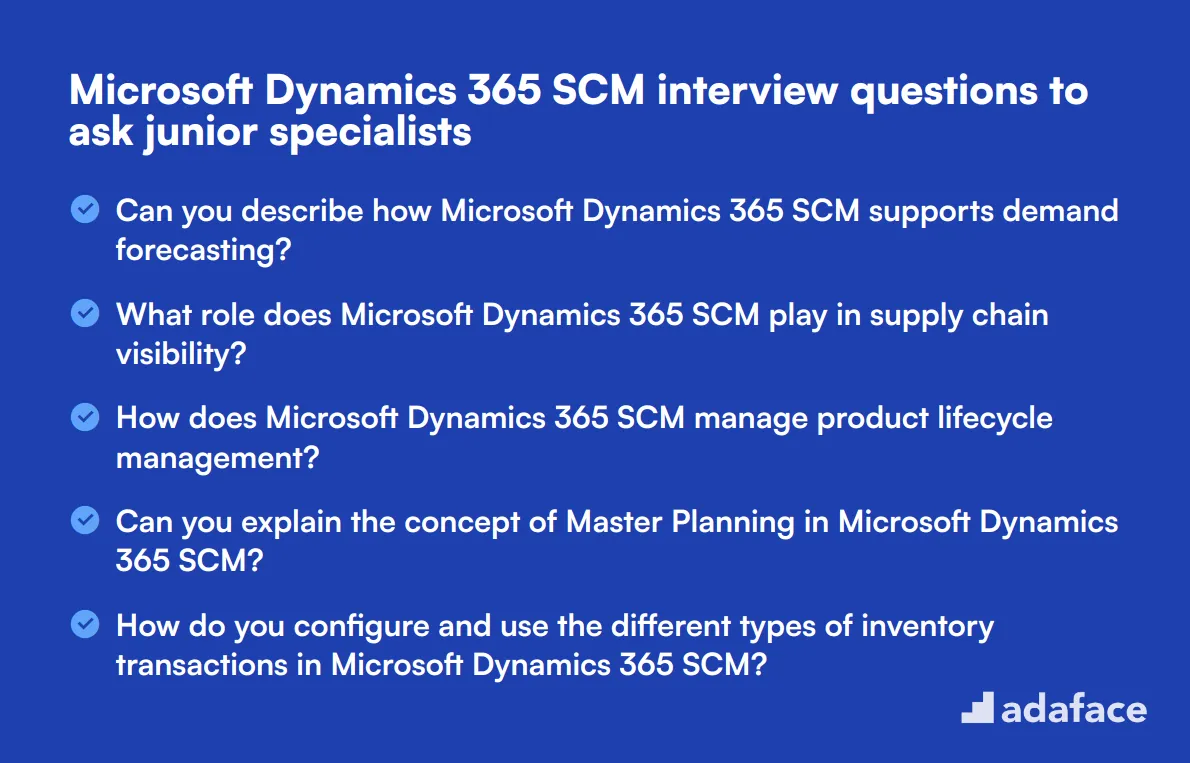
To assess the technical knowledge and practical skills of junior specialists in Microsoft Dynamics 365 SCM, consider using these targeted questions during your interviews. They can help you gauge an applicant's familiarity with the system and their ability to contribute effectively to your team, especially when looking for candidates with relevant expertise in Microsoft Dynamics 365.
- Can you describe how Microsoft Dynamics 365 SCM supports demand forecasting?
- What role does Microsoft Dynamics 365 SCM play in supply chain visibility?
- How does Microsoft Dynamics 365 SCM manage product lifecycle management?
- Can you explain the concept of Master Planning in Microsoft Dynamics 365 SCM?
- How do you configure and use the different types of inventory transactions in Microsoft Dynamics 365 SCM?
- What is the significance of the Item Master in Microsoft Dynamics 365 SCM?
- How would you approach setting up vendor relationships within Microsoft Dynamics 365 SCM?
- Can you explain how to create and manage bills of materials in Microsoft Dynamics 365 SCM?
- What steps would you take to troubleshoot a stock availability issue in Microsoft Dynamics 365 SCM?
- How does Microsoft Dynamics 365 SCM handle transportation management?
- Can you discuss the role of warehouse automation features in Microsoft Dynamics 365 SCM?
- What is the process for implementing change management within Microsoft Dynamics 365 SCM?
- How do you ensure data accuracy and integrity in Microsoft Dynamics 365 SCM?
- Can you explain the process of setting up pricing and discounts in Microsoft Dynamics 365 SCM?
- What are some common integration challenges you might face with Microsoft Dynamics 365 SCM?
- How does Microsoft Dynamics 365 SCM support compliance and regulatory requirements?
- Can you describe how to use the workflow capabilities in Microsoft Dynamics 365 SCM?
- What methods would you use to analyze supply chain performance in Microsoft Dynamics 365 SCM?
- How do you customize reports in Microsoft Dynamics 365 SCM to meet specific business needs?
- Can you explain the significance of master data in Microsoft Dynamics 365 SCM?
- What strategies would you use to train team members on Microsoft Dynamics 365 SCM functionalities?
7 Microsoft Dynamics 365 SCM interview questions and answers related to system functionalities
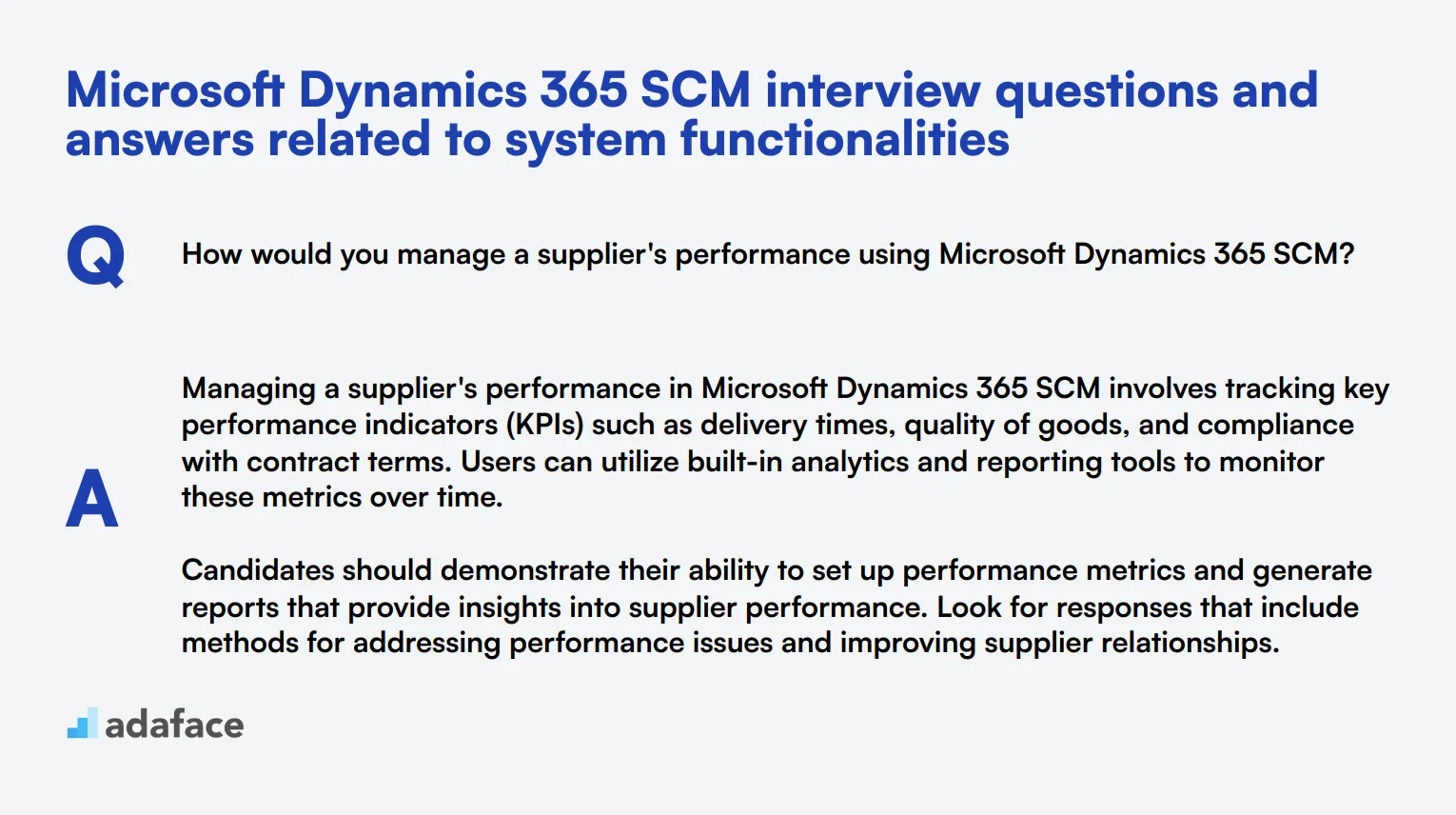
To effectively gauge the practical skills and knowledge of candidates applying for roles involving Microsoft Dynamics 365 SCM, consider using these targeted interview questions. Designed to assess understanding of system functionalities, these questions will help you identify the best fit for your team.
1. How would you manage a supplier's performance using Microsoft Dynamics 365 SCM?
Managing a supplier's performance in Microsoft Dynamics 365 SCM involves tracking key performance indicators (KPIs) such as delivery times, quality of goods, and compliance with contract terms. Users can utilize built-in analytics and reporting tools to monitor these metrics over time.
Candidates should demonstrate their ability to set up performance metrics and generate reports that provide insights into supplier performance. Look for responses that include methods for addressing performance issues and improving supplier relationships.
2. What are the steps to configure a new product in Microsoft Dynamics 365 SCM?
Configuring a new product in Microsoft Dynamics 365 SCM typically involves setting up the product master data, defining attributes and categories, and establishing relationships with suppliers and customers. The setup also includes specifying the product's inventory dimensions and pricing.
Ideal candidates will outline the entire process, demonstrating attention to detail and an understanding of how accurate product configuration impacts the overall supply chain. Look for mentions of using templates or automation features to streamline the process.
3. Can you describe how to handle returns and refunds in Microsoft Dynamics 365 SCM?
Handling returns and refunds in Microsoft Dynamics 365 SCM involves creating return orders, processing refunds or replacements, and updating the inventory records accordingly. The system provides functionalities to manage return policies and track return reasons.
Candidates should show familiarity with the return order process and how it integrates with inventory management and customer service. An ideal response will also include strategies for minimizing return rates and improving customer satisfaction.
4. How do you ensure compliance with industry regulations using Microsoft Dynamics 365 SCM?
Ensuring compliance with industry regulations involves setting up compliance checks, maintaining accurate records, and generating necessary reports. Microsoft Dynamics 365 SCM allows users to configure compliance frameworks and automate audit trails.
Look for candidates who can discuss specific compliance features within the system and how they have used these tools in previous roles. An understanding of the importance of compliance in safeguarding business integrity is crucial.
5. What strategies would you use to optimize warehouse space in Microsoft Dynamics 365 SCM?
Optimizing warehouse space involves using features such as advanced warehouse management modules, slotting and re-slotting, and implementing automated storage solutions. Dynamics 365 SCM provides tools to analyze space utilization and improve layout planning.
Candidates should outline their approach to space optimization, including the use of data analytics to make informed decisions. Look for a demonstrated ability to balance efficiency with flexibility to accommodate changing inventory needs.
6. How do you manage and track transportation costs in Microsoft Dynamics 365 SCM?
Managing and tracking transportation costs in Dynamics 365 SCM involves setting up transportation management modules, defining transportation routes, and using cost analytics tools. The system can track costs by shipment, carrier, and route to provide detailed cost insights.
An ideal candidate will explain how they use these tools to optimize transportation costs, negotiate better rates with carriers, and improve overall supply chain efficiency. Look for practical examples of cost-saving measures they have implemented.
7. How would you handle demand fluctuations using Microsoft Dynamics 365 SCM?
Handling demand fluctuations involves using demand forecasting tools, adjusting inventory policies, and implementing flexible production scheduling. Dynamics 365 SCM provides predictive analytics and real-time data to help manage changing demand.
Strong candidates will discuss specific features they use to anticipate and respond to demand changes, highlighting their ability to maintain service levels while minimizing excess inventory. Look for examples of successful demand management strategies.
12 Microsoft Dynamics 365 SCM interview questions about system configurations
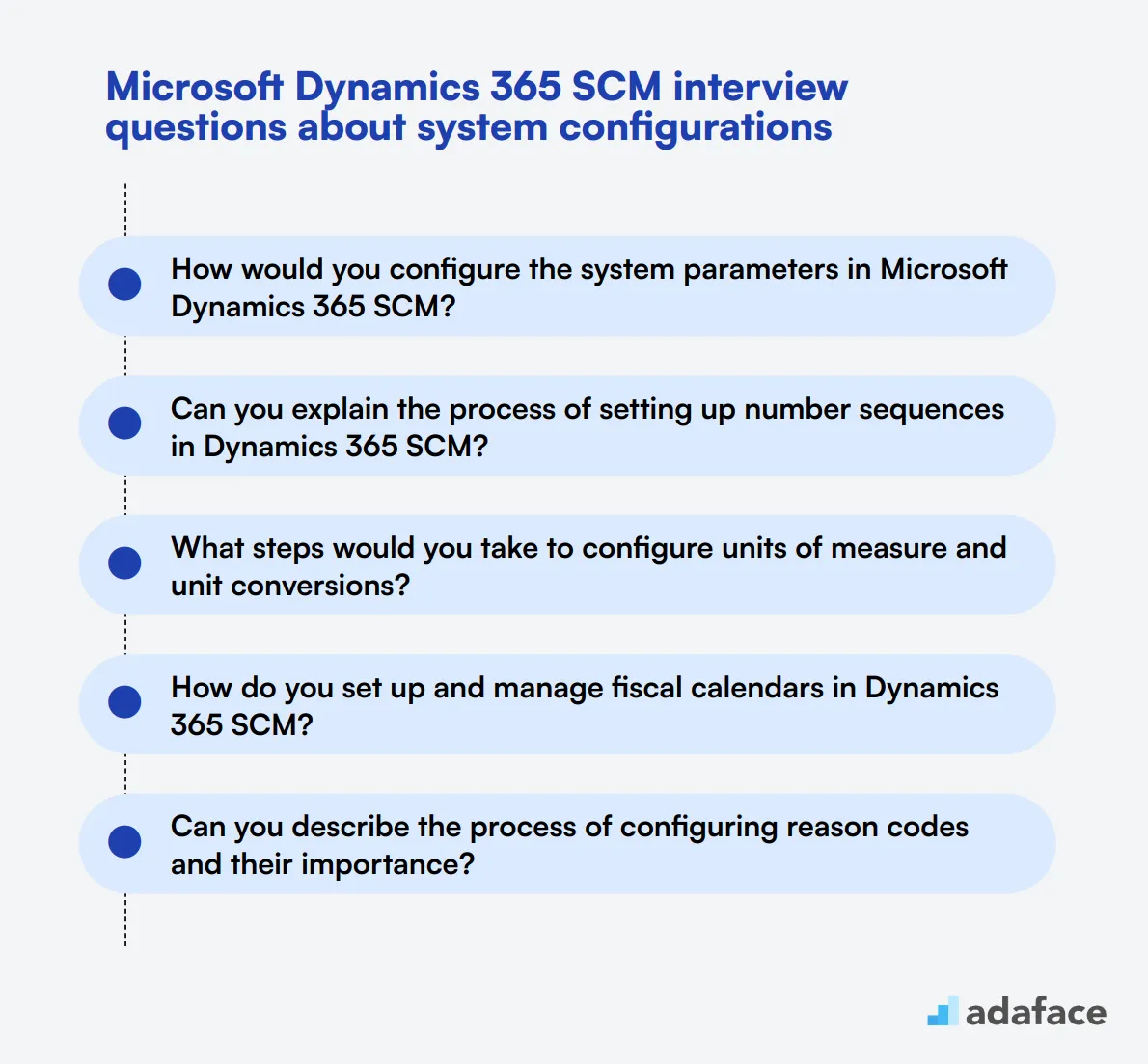
To assess a candidate's proficiency in configuring Microsoft Dynamics 365 SCM, consider asking these system configuration questions. These queries will help you evaluate the applicant's ability to set up and customize the platform to meet specific business needs.
- How would you configure the system parameters in Microsoft Dynamics 365 SCM?
- Can you explain the process of setting up number sequences in Dynamics 365 SCM?
- What steps would you take to configure units of measure and unit conversions?
- How do you set up and manage fiscal calendars in Dynamics 365 SCM?
- Can you describe the process of configuring reason codes and their importance?
- How would you approach setting up and managing batch attributes?
- What considerations are important when configuring dimension hierarchies?
- Can you explain how to set up and use catch weight items in Dynamics 365 SCM?
- How do you configure and manage sites and warehouses in the system?
- What steps are involved in setting up and maintaining ledger accounts?
- How would you configure and use the global address book in Dynamics 365 SCM?
- Can you describe the process of setting up and managing batch disposition codes?
10 situational Microsoft Dynamics 365 SCM interview questions for hiring top specialists
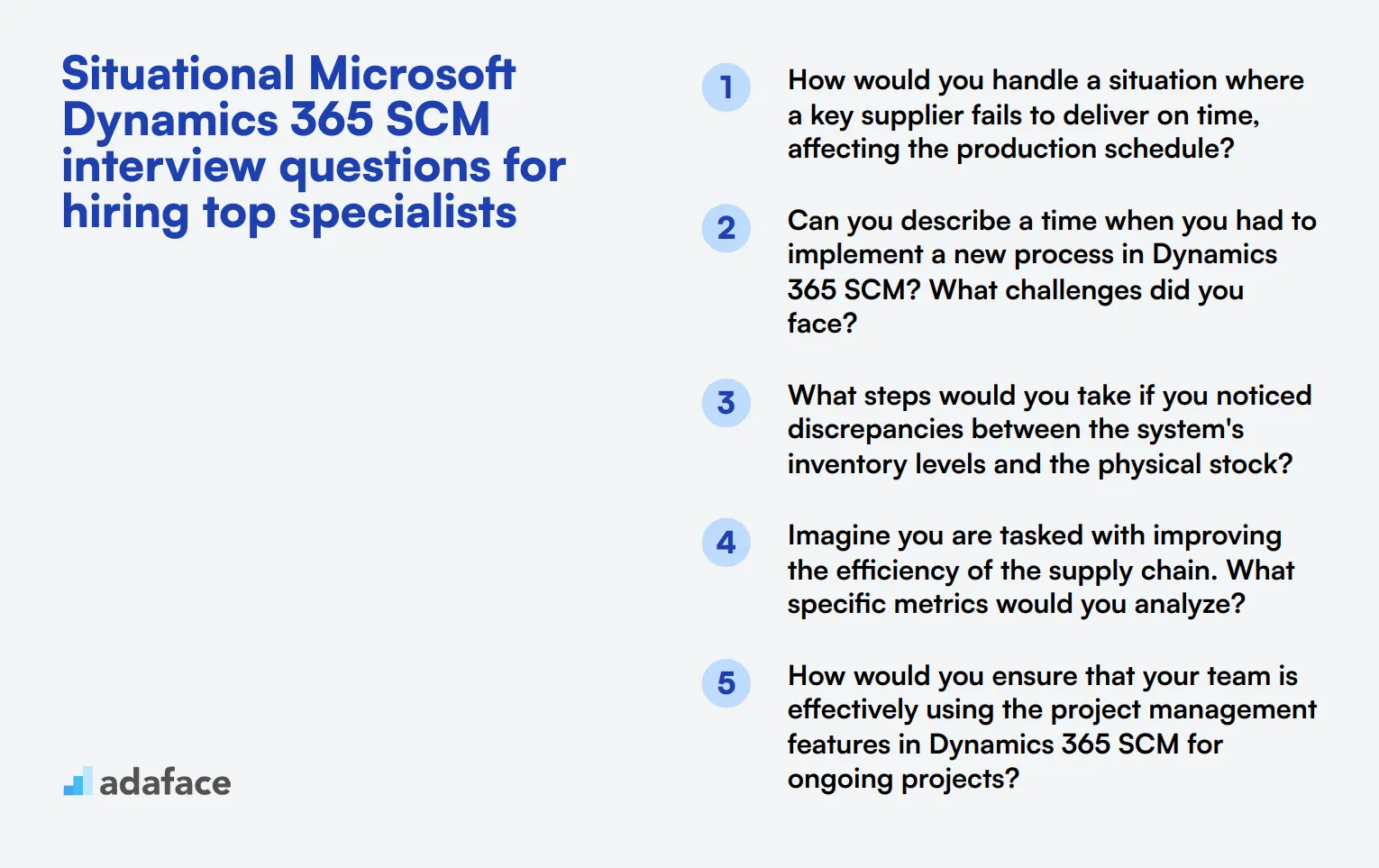
To identify top talent for roles involving Microsoft Dynamics 365 SCM, consider using this list of situational interview questions. These questions are designed to assess candidates' practical knowledge and problem-solving skills in real-world scenarios, helping you find the right fit for your team.
- How would you handle a situation where a key supplier fails to deliver on time, affecting the production schedule?
- Can you describe a time when you had to implement a new process in Dynamics 365 SCM? What challenges did you face?
- What steps would you take if you noticed discrepancies between the system's inventory levels and the physical stock?
- Imagine you are tasked with improving the efficiency of the supply chain. What specific metrics would you analyze?
- How would you ensure that your team is effectively using the project management features in Dynamics 365 SCM for ongoing projects?
- Can you provide an example of how you resolved a conflict between departments regarding inventory allocation?
- What would you do if a critical error occurred during the order fulfillment process in Dynamics 365 SCM?
- If you were asked to lead a cross-functional team to optimize warehouse layout, what factors would you consider?
- How would you approach implementing changes to product pricing in Dynamics 365 SCM during a market downturn?
- What strategy would you use to train a new employee on the complexities of Dynamics 365 SCM in a limited time frame?
Which Microsoft Dynamics 365 SCM skills should you evaluate during the interview phase?
While it's challenging to assess every aspect of a candidate in a single interview, focusing on core Microsoft Dynamics 365 SCM skills is crucial. These key competencies form the foundation for success in this role and should be prioritized during the evaluation process.

Supply Chain Management Fundamentals
A strong grasp of supply chain management principles is essential for working with Microsoft Dynamics 365 SCM. This knowledge forms the basis for effectively utilizing the system's features and optimizing supply chain processes.
Consider using an assessment test with relevant multiple-choice questions to gauge candidates' understanding of supply chain concepts. This approach can help filter candidates based on their theoretical knowledge.
To evaluate this skill during the interview, ask targeted questions about supply chain management principles and their application in Dynamics 365 SCM. Here's an example question:
Can you explain how Dynamics 365 SCM supports demand forecasting and how it impacts inventory management?
Look for answers that demonstrate an understanding of demand forecasting features in Dynamics 365 SCM and how they integrate with inventory management. Candidates should be able to explain the benefits of accurate forecasting and its impact on stock levels and order fulfillment.
Microsoft Dynamics 365 SCM Functionality
Proficiency in Microsoft Dynamics 365 SCM's core functionalities is crucial for effectively implementing and managing the system. This includes understanding modules like inventory management, procurement, and production control.
Utilize our Microsoft Dynamics 365 Supply Chain Management Functional Consultant Test to assess candidates' knowledge of the system's features and capabilities.
During the interview, ask specific questions about Dynamics 365 SCM modules and their applications. Here's an example:
How would you use Dynamics 365 SCM to optimize the procurement process for a manufacturing company?
Evaluate responses for knowledge of the procurement module, integration with other SCM components, and understanding of process optimization. Look for mentions of features like vendor management, purchase order automation, and integration with inventory control.
Data Analysis and Reporting
The ability to analyze data and generate insightful reports is key in leveraging Dynamics 365 SCM effectively. This skill enables better decision-making and performance tracking across the supply chain.
Consider using a data analysis assessment to evaluate candidates' ability to interpret supply chain data and metrics.
To assess this skill, ask candidates about their experience with data analysis in a supply chain context. Here's a sample question:
Describe a situation where you used Dynamics 365 SCM's reporting tools to identify and address a supply chain inefficiency.
Look for answers that demonstrate the ability to extract relevant data, analyze it effectively, and use insights to drive improvements. Candidates should show familiarity with Dynamics 365 SCM's reporting capabilities and how they apply to real-world supply chain challenges.
Hire Top Microsoft Dynamics 365 SCM Talent with Skills Tests and Targeted Interviews
When hiring for Microsoft Dynamics 365 SCM roles, it's important to verify candidates' skills accurately. This ensures you bring on board team members who can truly contribute to your supply chain management processes.
A reliable way to assess these skills is through targeted skills tests. Consider using the Microsoft Dynamics 365 Supply Chain Management Functional Consultant Test to evaluate candidates' expertise.
After using skills tests to shortlist top applicants, you can invite them for interviews. Use the interview questions provided in this post to dive deeper into their knowledge and experience with Microsoft Dynamics 365 SCM.
Ready to streamline your hiring process for Microsoft Dynamics 365 SCM roles? Sign up to access our comprehensive assessment platform and find the right talent for your team.
Microsoft Dynamics 365 Finance Test
Download Microsoft Dynamics 365 SCM interview questions template in multiple formats
Microsoft Dynamics 365 SCM Interview Questions FAQs
The list includes general questions, junior specialist questions, system functionality questions, configuration questions, and situational questions for Microsoft Dynamics 365 SCM interviews.
These questions can help assess candidates' knowledge, experience, and problem-solving skills related to Microsoft Dynamics 365 SCM, allowing you to make informed hiring decisions.
Yes, the questions cover various experience levels, from junior specialists to top experts in Microsoft Dynamics 365 SCM.
Use a mix of questions from different categories to get a well-rounded understanding of the candidate's skills and experience. Adapt the questions based on the specific role and requirements.

40 min skill tests.
No trick questions.
Accurate shortlisting.
We make it easy for you to find the best candidates in your pipeline with a 40 min skills test.
Try for freeRelated posts
Free resources




